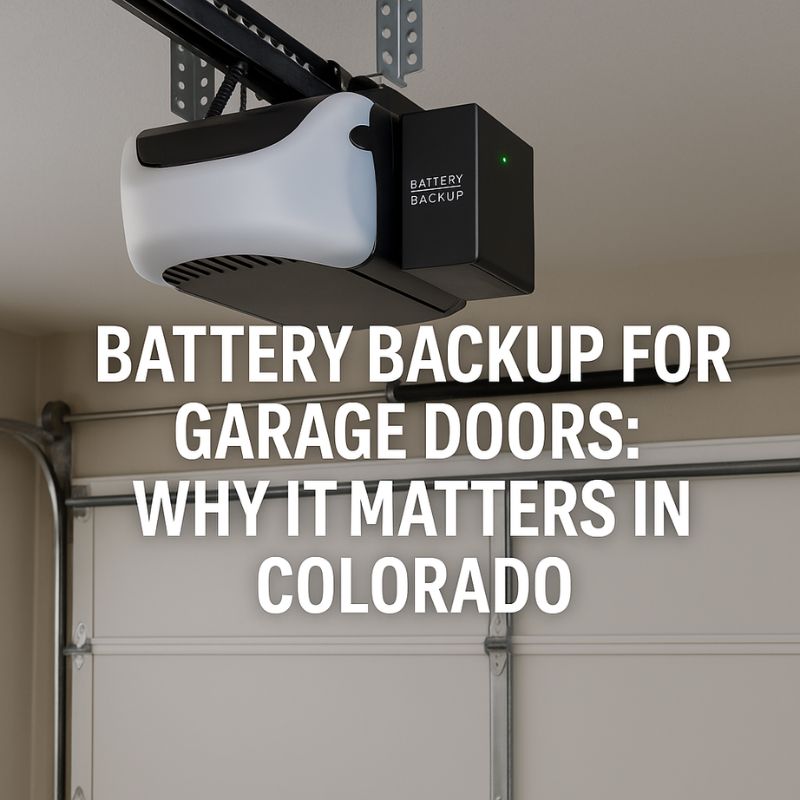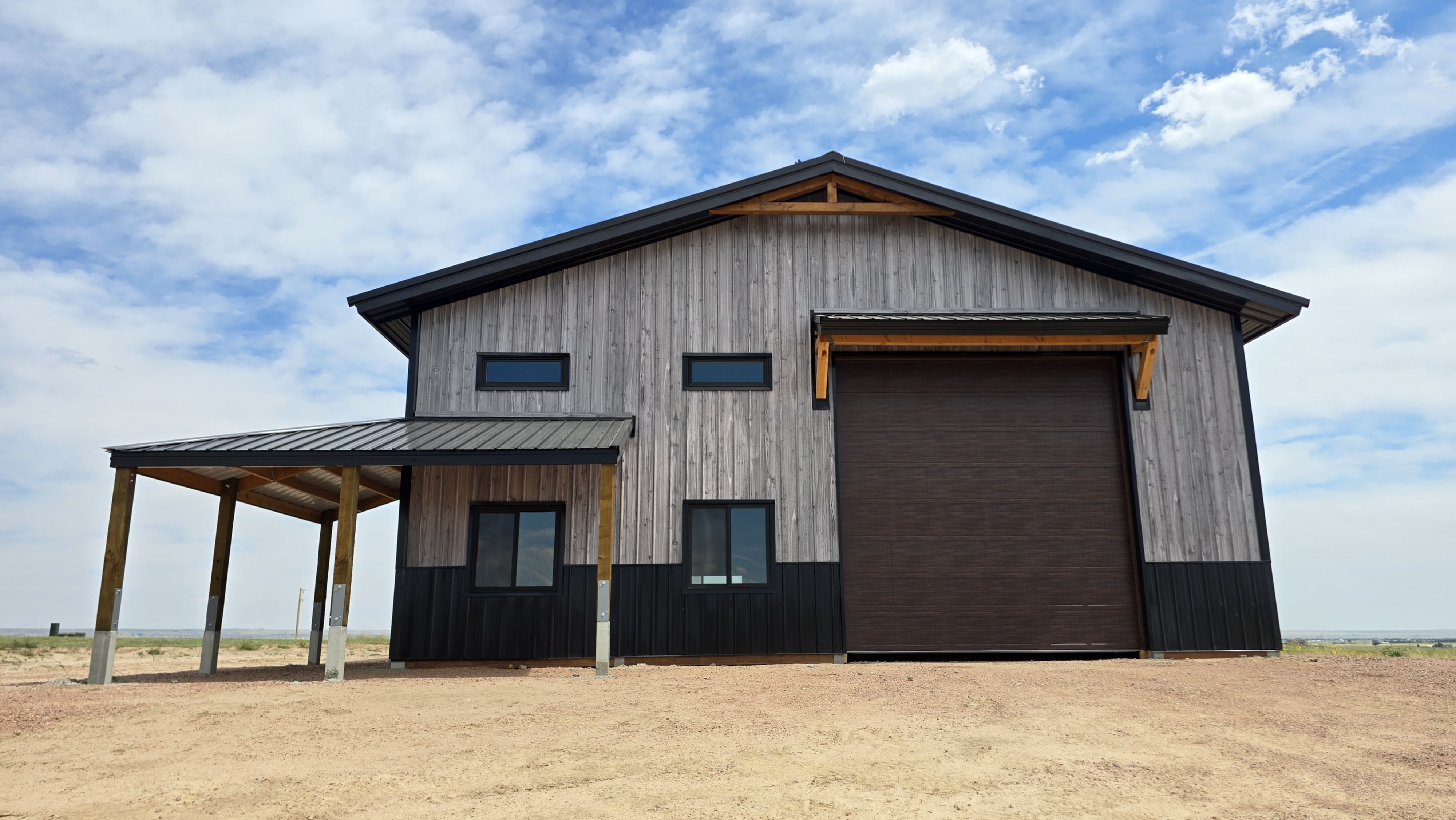Battery Backup for Garage Doors: Why It Matters in Colorado
When a power outage hits—whether from a snowstorm, wildfire, or rolling blackout—your garage door could leave you stuck outside or trapped inside.
That’s why having a garage door battery backup is more than just a convenience—it’s a safety essential.
Colorado residents face unpredictable weather and rising power reliability concerns.
In this guide, we’ll break down why battery backup systems for Colorado garage doors are so important, how they work, and what to look for when choosing one.
What Is a Garage Door Battery Backup?
A garage door battery backup is a built-in or add-on power source that allows your garage door opener to function during an electrical outage. When the power goes out, the battery kicks in automatically—so you can still open and close the door using your remote or wall control.
Key functions of a battery backup:
- Opens and closes the garage door ~20–30 times on a full charge
- Charges automatically when power is restored
- Works seamlessly with compatible openers
- Provides access and security during an emergency
This is not a generator or whole-home solution—just a targeted emergency system for your garage.
Why Colorado Homeowners and Businesses Need One
Between snowstorms, wind damage, and wildfires, Colorado has no shortage of threats to your electrical system. Garage doors are often your main access point—and if they’re inoperable, your car, tools, or equipment could be unreachable.
Here’s why a garage door battery backup is especially important in Colorado:
❄️ 1. Winter Storms and Icy Conditions
Snow and ice buildup can cause power lines to snap or transformers to fail. Being able to open your garage door manually in freezing conditions is not only inconvenient—it can be dangerous.
🔥 2. Wildfire Season
Even if a wildfire is not directly affecting your property, power companies may cut electricity to prevent ignition. You do not want to be locked inside your home or business when evacuation is necessary.
⚠️ 3. Emergency Preparedness
Battery backups turn your garage into a safe, reliable exit point. This is especially critical for:
- Elderly homeowners
- People with mobility issues
- Families with young children
- Businesses needing 24/7 vehicle access
4. California Code Influence and Rising Standards
States like California now require battery backup on all new garage door openers. While Colorado has not yet passed similar laws, many builders, insurance carriers, and HOAs now recommend or require them for new installations.
How Does an Emergency Garage Door Opener Work?
The battery unit is usually built into or mounted near your garage door opener. It stores power while your system operates normally and only activates when your home or building loses power.

Basic components include:
- Sealed lead-acid or lithium-ion battery
- Built-in charger
- Smart switch that detects outages
- LED indicators showing charge levels
Emergency garage door openers do not require complicated wiring or backup power infrastructure. Many modern models include app alerts when the system switches to battery mode.
Benefits of Installing a Battery Backup
Access During Power Outages
You’ll never be stuck outside in the cold or unable to get to work because your door won’t open.
Security
Keeps your garage—and what’s inside—secure. No need to leave it open just in case of an outage.
Safety
Enables fast exits during emergencies like fires or carbon monoxide alarms.
Peace of Mind
Whether you’re at home, out of town, or at work, you can trust your garage door will still function.
Which Garage Door Openers Are Battery Backup Compatible?
Many major garage door opener brands now offer models with garage door battery backup as a standard feature or optional add-on.
Popular compatible brands:
- LiftMaster (built-in battery backup on many models)
- Chamberlain (battery backup models available)
- Genie (battery sold separately for select openers)
If you’re installing a new opener, ask your installer to include a model with a backup. If you already have an opener, check with a Colorado garage door professional to see if your system can be retrofitted.
How Long Do Backup Batteries Last?
Most garage door battery backups last 1–2 years with normal use. The lifespan depends on:
- Frequency of outages
- How often you open/close the door
- Type of battery (lithium lasts longer than lead-acid)
Maintenance Tips:
- Test your backup battery twice a year
- Replace when charge times increase or performance drops
- Keep the opener plugged in so the battery stays charged
Some smart openers will alert you when the battery is low or nearing end of life.
Common Questions
Can I open my garage door manually without a battery backup?
Yes, but it requires pulling the red emergency release cord and lifting the door manually. This can be difficult in the dark, with a heavy door, or for older adults.
How much does a battery backup cost?
Battery backup units typically range from $75 to $200 depending on the model. Some opener systems include them as part of the package.
Can businesses benefit too?
Absolutely. Emergency fleet access, delivery operations, and secure warehouse entry are all reasons for commercial battery backups. Don’t wait until it costs you a day of operations.
Ready to Stay Powered Up?
When it comes to Colorado garage doors, power outages are not a question of “if”—but “when.” Installing a garage door battery backup ensures you are prepared for emergencies, protects your property, and keeps life moving even when the lights go out.
At Third Gen Garage Doors, we offer battery backup installation, opener upgrades, and full emergency garage door systems.
Whether you need a residential upgrade or a commercial safety solution, our team is here to help you plan ahead—with confidence.







